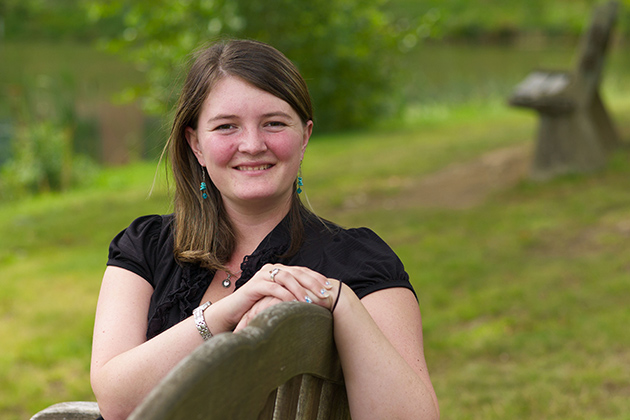
Alexandria Bottelsen ’16 (CLAS) likes to look at the big picture. A resident of Brookfield, Conn., she is an Honors student pursuing a double major in English and Secondary Education. One of the reasons she chose to attend UConn is its large size and the myriad academic and social opportunities at the University.
As a freshman last year, Bottelsen decided to take another big chance and apply for a place in the highly competitive Fulbright Summer Institute program to study at King’s College, London, one of nine Fulbright Summer Institute sites in the UK. She was excited and pleased when she was accepted, but in her words, “I’m the kind of person who says, ‘I’m going to do this … now, how?’”
Bottelsen’s Honors advisor Jessamy Hoffmann says, “Alex is obviously not afraid of a challenge. I remember her coming to our first advising meeting [last year] with a color-coded schedule she had created. She has continued to be that organized, as well as exuberant about opportunities.”

It was Bottelsen who learned about the Fulbright opportunity and, with guidance from the Office of National Scholarships & Fellowships, went after it, Hoffmann notes. “It was Alex who had the courage to try, and to start out on an adventure of her own making.”
The Fulbright Commission selects participants for its summer program thorough a rigorous application and interview process. Factors taken into consideration include academic excellence, a focused application, a range of extracurricular and community activities, and a willingness on the part of applicants to ‘give back’ to their communities when they return home. While most Fulbright awards are geared toward teaching and/or research grants to faculty and experienced professionals either from the U.S. or visiting the U.S., the Summer Institute focuses on undergraduates with at least two more years of study ahead of them.

“One of the things that made me want to apply for the Fulbright was the chance to study in England,” Bottelsen says. “I love the culture, and I want to teach high school English when I graduate. What better opportunity than to go to King’s College in London to study, and to have the chance to visit the Dickens museum, to see a Shakespearean play, and to get immersed in the history of the country for three weeks this early in my academic career?”
Although the Fulbright Commission doesn’t release exact figures on the number of applicants, only four U.S. undergraduates get the opportunity to study at King’s College, London as part of the Summer Institute each year. In 2013, students were selected from Binghamton University in New York, Kansas State, and Princeton, in addition to UConn.
“It was pretty surreal,” Bottelsen says, “and I didn’t really believe it until I got off the plane in England. I’d flown over with another student who was also in the program, and we were met at Heathrow [Airport] by two mentors who were master’s degree students at Kings [College]. They showed us the ropes and immediately made us feel right at home.”

The theme of this year’s program was “London and the British City, Past and Present.” It included a look at British cities as social, economic, political, and cultural entities, and as driving forces of globalization. The first week was tailored around sports, with a trip to the Wimbledon tennis championships that included a guest lecture by paralympian Rob Richardson of the British sitting volleyball team. There was also a master class on the comparative history of U.S. and British sports taught by Uta Balbier, director of the Institute of North American Studies at King’s and a leading sports historian.
Other master classes that focused on differences in perspective between the U.S. and the UK on such topics as culture, education, and politics were taught by professors from King’s College and by a representative from the U.S. Embassy.
In addition to exploring London, students traveled to the cities of Manchester and Liverpool during their stay, and they also had a brief weekend trip to Brighton Beach on the south coast, which Bottelsen describes as having pebbles ‘the size of golf balls.’
LuAnn Saunders-Kanabay, assistant director in the Office of National Scholarships & Fellowships, says, “Alex’s selection for the Fulbright UK Summer program is an example of the ability of UConn students to compete at the national level for prestigious awards. We’re here to provide support and guidance to all our students interested in participating in national award competitions, and she is a great example of a motivated student who saw an opportunity and went after it; we’re delighted by the positive feedback we’ve had from her.”
As she begins her sophomore year, Bottelsen has taken up right where she left off, meeting both academic and extracurricular challenges head on. She is a tutor at the Writing Center and works as an Honors Facilitator mentoring first-year students.
She says her Fulbright experience is something she’ll never forget: “I’ve benefitted from this experience in so many ways already, and I’m sure I’ll take what I learned with me when I eventually start my teaching career.”
And chances are that she will have her eye on some of the other prizes available through the Office of National Scholarships & Fellowships, as she climbs the academic ladder here at UConn.


